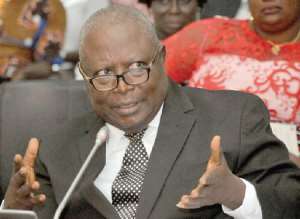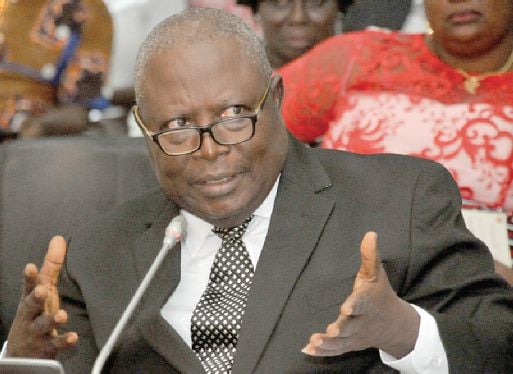Bawku conflict: Martin Amidu challenges Akufo-Addo and Bawum…

Former Attorney General, Martin Amidu has called on President Nana Addo Dankwa Akufo-Addo and Vice President Dr. Mahamudu Bawumia to account for their handling of national security amidst the resurgence of the Bawku conflict.
In a detailed statement, he criticised the government for its perceived failure to address escalating tensions in Bawku and other conflict zones, describing the situation as a “preventable resurgence” driven by political interests.
“While citizens in conflict areas suffer and die, the political elite benefit from public funds meant for peacekeeping and exploit the emotional toll for partisan electoral gains,” Amidu stated.
He emphasised the need for transparency, urging the President and Vice President to demonstrate competent leadership by addressing the root causes of the ongoing crisis. Amidu highlighted that the security of citizens should be prioritized over political rhetoric, particularly as the December 2024 general elections approach.
“The rhetoric of development must be supported by the deed of maintaining human security for the sovereign electorate to earn their trust,” he added.
Martin Amidu also expressed concern over the silence of government officials and the perceived lack of urgency in resolving the crisis. He alleged that partisan motives and inadequate responses have exacerbated the conflict, leading to growing mistrust in security agencies.
Calling for accountability, he urged the government to provide clear reports on casualties, ongoing peacekeeping efforts, and the measures being taken to address the volatile situation. He argued that withholding such critical information fuels misinformation and deepens the divide among citizens.
As tensions persist, Amidu’s remarks spotlight the need for a balanced approach that prioritises peace, stability, and citizen welfare over partisan gains in the lead-up to the elections.
Read Martin Amidu’s full statement below.
Government must account to the electorate for the violent conflicts before the 2024 elections:
BY MARTIN A. B. K. AMIDU
The resurgence of the Bawku intractable fratricidal conflict in October 2024 as an instrument of partisan political election engineering to influence the electorate is the clearest example of the politicization of intractable conflicts by incumbent governments any time elections are knocking at the door in Ghana. The resurgent Bawku conflict with high intensity almost two months to this year’s elections was supervised by the Vice President, Dr. Mahamudu Bawumia, during the absence of the President without the sovereign people of Ghana apprised of what the government was doing to contain the situation. Even with the return of the President to the country, there is still an eerie silence on the situation.
The fact that Parliament has not been in session during the period of the resurgence of the conflict is not an excuse for the government to render the electorate mere spectators to what is happening in the conflict hotspots in Ghana, particularly in Bawku and its environ which has extended to affect communities in the North East, and Northern Regions. The citizen must be apprised directly and transparently by the government on how many compatriots are dead and maimed in the intractable conflicts throughout the country during this election season to avoid speculation and the spreading of disinformation and misinformation. This is a constitutional right and not one dispensed at the sufferance of incumbent governments. The devil finds work for the uninformed, disinformed, and misinformed.
On 21 November 2024, yesterday, I was told by citizens on both sides enduring the emotional trauma of the government generated resurgent conflict in the Bawku township and its environs that the previous night had been terrible for them in terms of renewed fighting amongst the adversaries and their supporters. This was despite the curfew placed on the township and its environs by the incumbent government and the security agencies deployed at enormous cost to the public purse on the ground. When I sought to know what might have caused the exchange of gun shots, I learnt that it resulted form suspicions from the parties in conflict about the role of the security agencies in managing the conflict.
I have posited in previous articles that the resurgence of the October 2024 Bawku fratricidal conflict is government generated as a result of the deliberate creation of a failure of human security for political electioneering which benefits the partisan merchants of conflict. On Wednesday, 20 November 2024, the security agencies managing the conflict continued their government instructed task of escorting vehicles and people in and out of the Bawku township during the curfew hours between 20:00 hours and 21:00 hours without any incident. But one of the adversaries received information that a long red bus, suspected to be conveying arms into the Bawku township for the purpose of destabilizing the grounds in the township and its environs before the elections to render it impossible for the inhabitants to exercise their franchise, was traveling towards Bawku escorted by two armoured vehicles. The Regional Minister had made these escort arrangements with the security agencies.
There was an ambush around the former Vegetable Oil Mills Company opposite the District Veterinary Office. When the red bus got to the location that night an exchange of gun fire between the security escorts and the adversaries laying in wait ensured. Reinforcement of security was summoned, only to arrive after the belligerents had fled. The red bus managed to drive safely to the Bawku Police Station with occupants in it allegedly maimed, according to my informants. As usual, the security agencies the next morning, 21 November 2024, cordoned off the area of the ambush and its environs to search for suspects. Most young men in the area suspecting the work habit of the security agencies for brutalities against unarmed civilians had fled. They had learnt from the brutalities meted out to their compatriots in Garu and its environs last year.
Apart from this incident, I received information that another person from Yerongo met his death while his companion escaped around Maziamah on suspicion of running a recognisance mission for the launch of an attack on an adversary. There is also a video making the rounds in which a young woman claiming to be a Bawku resident Dagomba from the Northern Region and a civil society activities is addressing women and urging for peace to enable the women vote massively for Dr. Mahamudu Bawumia at the impending elections.
The situation in the Bawku township and its environs has become demanding on the inhabitants who are not directly adversaries in the government generated resurgent conflict. The inhabitants of the Bawku town centre are unable to purchase gas for cooking because there are only two gas stations in the Bawku township and its environs – one at Missiga on the way to the Ghana Revenue Authority’s customs barrier office on the Bawku-Kulungugu Road, and the second one opposite the Bawku Senior High School on the Bawku-Bolgatanga Road. Consequently, the security agencies have become conduits collecting the gas cylinders from the township to purchase gas for the inhabitants of the town centre.
The Upper East Minister appears to have abdicated his responsibilities since 20 October 2024 for maintaining the security of the Upper East Region to the Presidency in Accra which pursues its electoral agenda. Citizens from both sides of the conflict are maimed and killed without Ghanaians being told of the official numbers killed and maimed. Ghana has become the private property of political parties and their merchants of conflict political elites. The citizen has indeed become only a spectator even when he would soon be called upon to exercise his franchise. But the vehicles of heads of the security agencies were seen breathing towards the Regional Coordinating Council premises in Bolgatanga yesterday after the previous night’s, 20 November 2024, encounter in Bawku for a meeting. The Regional Minister, however, ought to be conscious of the fact when he is suspected of using armoured vehicles to convey party supporters from Bawku and its environs to Bolgatanga for political party meetings suspicions around him multiply even within the security agencies in such a conflict environment. As Thomas Sankara once said, the soldier is a civilian in uniform.
The 1992 Constitution has been turned into an instrument for zombifying the electorate to vote on sentiments and not achievements. Honour and integrity have been thrown out of the window of Ghanaian politics. Social media appears to be the only means of information, true, false, or questionable, for the citizen. As a result, both sides in the fratricidal conflict in Bawku learnt to use social media as a means of by-passing the blackout on information from the conflict area to the citizen, even though reasonable persons ought to scrutinize them for partisanship and deliberate disinformation to aid the side disseminating the information.
Nonetheless, the information is useful for purposes of a reasonable assessment of sentiments and analysis of public reactions.
Whilst the people who constitute the sovereign electorate in the conflict area are killing themselves as a result of the preventable resurgence of conflict, the political elite have become merchants of conflict and violence benefitting from the public funds appropriated for the alleged maintenance of peace, and reaping the emotions generated by the conflict for partisan electoral gains. We the People delegated our sovereign power as citizens to the incumbent government at the polls on 7 December 2020. It is, therefore, imperative that the President and his Vice-President, the anointed successor, prove themselves as having provided the most competent leadership during their tenure by transparently accounting to We the People for how they managed our security in the past eight years and still brought the country to the Bawku crisis with nine other violent conflict points in several other regions before the vote on 7 December 2024. The rhetoric of development must be supported by the deed of maintaining the human security of the sovereign electorate in order to win the vote on 7 December 2024.
Martin A. B.K. Amidu
(Citizen Vigilante and Shadow Vice-President)
22 November 2024

